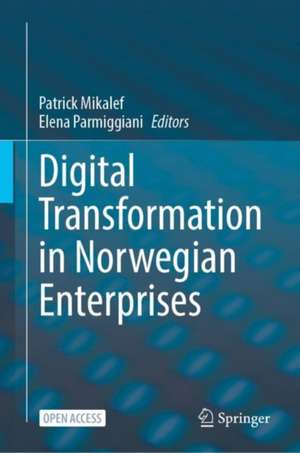Digital Transformation in Norwegian Enterprises
Editat de Patrick Mikalef, Elena Parmiggianien Limba Engleză Paperback – 17 iun 2022
The book starts with an introductory chapter summarizing a vast body of literature in order to synthesize what is already known about digital transformation before exploring the Norwegian context in more detail. Then a series of case studies from the private and public sector in Norway is presented. They document a process perspective which describes the sequence of events during and after adoption of digital solutions, as well as the types of business value that were realized. Through these single studies, the process of digital transformation is illustrated, a number of key findings highlighted, and eventually theoretical and practical recommendations based on these cases emphasized. The book closes with a brief overview of some emerging technologies, and comments on how they are likely to change different sectors.
Digital transformation has been one of the priority areas for the Norwegian government over the past years and puts Norwegian enterprises upfront in adopting novel technologies and utilizing them for achieving organizational goals. This experience accumulated over the years makes the Norwegian context a particularly interesting one in understanding how private and public organizations make use of new digital solutions, what lessons can be learnt during the process, and what are some of the key success and failure factors. This way the book is written for practitioners who are currently involved in digital transformation projects in their organizations, researchers of information systems and management, aswell as master students in degrees of informatics and technology management.
| Toate formatele și edițiile | Preț | Express |
|---|---|---|
| Paperback (1) | 299.81 lei 43-57 zile | |
| Springer International Publishing – 17 iun 2022 | 299.81 lei 43-57 zile | |
| Hardback (1) | 363.00 lei 43-57 zile | |
| Springer International Publishing – 17 iun 2022 | 363.00 lei 43-57 zile |
Preț: 299.81 lei
Preț vechi: 374.76 lei
-20% Nou
Puncte Express: 450
Preț estimativ în valută:
57.37€ • 60.06$ • 47.47£
57.37€ • 60.06$ • 47.47£
Carte tipărită la comandă
Livrare economică 07-21 aprilie
Preluare comenzi: 021 569.72.76
Specificații
ISBN-13: 9783031052781
ISBN-10: 3031052781
Pagini: 196
Ilustrații: XIV, 196 p. 30 illus., 22 illus. in color.
Dimensiuni: 155 x 235 mm
Greutate: 0.3 kg
Ediția:1st ed. 2022
Editura: Springer International Publishing
Colecția Springer
Locul publicării:Cham, Switzerland
ISBN-10: 3031052781
Pagini: 196
Ilustrații: XIV, 196 p. 30 illus., 22 illus. in color.
Dimensiuni: 155 x 235 mm
Greutate: 0.3 kg
Ediția:1st ed. 2022
Editura: Springer International Publishing
Colecția Springer
Locul publicării:Cham, Switzerland
Cuprins
An Introduction to Digital Transformation.- The Case of Norway and Digital Transformation over the Years.- Part I: Private Enterprises.- From Integrated to Remote Operations: Digital Transformation in the Energy Industry as Infrastructuring.- The Norwegian Mobile Telephony and Internet Markets.- Digital Transformation in Renewable Energy: Use Cases and Experiences from a Nordic Power Producer.- From Intention to Use to Active Use of a Mobile Application in Norwegian ETO Manufacturing.- Part II: Public Enterprises.- Digital Transformation in NAV IT 2016–2020: Key Factors for the Journey of Change.- Improving Digitization of Urban Mobility Services with Enterprise Architecture.- Operating Room of the Future (FOR) Digital Healthcare Transformation in the Age of Artificial Intelligence.- Part III: Synthesis.- A Framework for Digital Transformation for Research and Practice: Putting Things into Perspective.- The Way Forward: A Practical Guideline for Successful Digital Transformation.- Concluding Remarks and Final Thoughts on Digital Transformation.
Notă biografică
Patrick Mikalef is an Associate Professor in Data Science and Information Systems at the Department of Computer Science, NTNU, Trondheim, Norway, and a research scientist at the Department of Technology Management in SINTEF Digital. His research interests focus the on strategic use of information systems and IT-business value in turbulent environments. He has published work in international conferences and peer-reviewed journals including the Journal of the Association for Information Systems, British Journal of Management, European Journal of Information Systems, and Information and Management.
Elena Parmiggiani is an Associate Professor in Computer-Supported Cooperative Work (CSCW) and Digital Collaboration and Deputy Head of Department for Sustainability at the Department of Computer Science at NTNU, Trondheim, Norway. Her primary research interest is the study of the empirical challenges of implementing and maintaining sustainable digital platforms froma sociotechnical perspective. She has published in international conferences and peer-reviewed journals including Management of Information Systems Quarterly, Journal of the Association for Information Systems, CSCW Journal, Science and Technology Studies Journal, and the Scandinavian Journal of IS.
Elena Parmiggiani is an Associate Professor in Computer-Supported Cooperative Work (CSCW) and Digital Collaboration and Deputy Head of Department for Sustainability at the Department of Computer Science at NTNU, Trondheim, Norway. Her primary research interest is the study of the empirical challenges of implementing and maintaining sustainable digital platforms froma sociotechnical perspective. She has published in international conferences and peer-reviewed journals including Management of Information Systems Quarterly, Journal of the Association for Information Systems, CSCW Journal, Science and Technology Studies Journal, and the Scandinavian Journal of IS.
Textul de pe ultima copertă
This open access book presents a number of case studies on digital transformation in Norway, one of the fore-runners in the digital progress index established by the European Commission in 2020. They explore the process of adoption, diffusion and value generation from digital technologies, and how the use of different digital solutions has enabled Norwegian enterprises to digitally transform their operations and business models.
The book starts with an introductory chapter summarizing a vast body of literature in order to synthesize what is already known about digital transformation before exploring the Norwegian context in more detail. Then a series of case studies from the private and public sector in Norway is presented. They document a process perspective which describes the sequence of events during and after adoption of digital solutions, as well as the types of business value that were realized. Through these single studies, the process of digital transformation is illustrated, a number of key findings highlighted, and eventually theoretical and practical recommendations based on these cases emphasized. The book closes with a brief overview of some emerging technologies, and comments on how they are likely to change different sectors.
Digital transformation has been one of the priority areas for the Norwegian government over the past years and puts Norwegian enterprises upfront in adopting novel technologies and utilizing them for achieving organizational goals. This experience accumulated over the years makes the Norwegian context a particularly interesting one in understanding how private and public organizations make use of new digital solutions, what lessons can be learnt during the process, and what are some of the key success and failure factors. This way the book is written for practitioners who are currently involved in digital transformation projects in their organizations, researchers of information systems and management, as well as masterstudents in degrees of informatics and technology management.
Digital transformation has been one of the priority areas for the Norwegian government over the past years and puts Norwegian enterprises upfront in adopting novel technologies and utilizing them for achieving organizational goals. This experience accumulated over the years makes the Norwegian context a particularly interesting one in understanding how private and public organizations make use of new digital solutions, what lessons can be learnt during the process, and what are some of the key success and failure factors. This way the book is written for practitioners who are currently involved in digital transformation projects in their organizations, researchers of information systems and management, as well as masterstudents in degrees of informatics and technology management.
Caracteristici
This book is is open access which means you have free and unlimited access Explores the process of adoption, diffusion and value generation from digital technologies in Norwegian enterprises Highlights key findings and presents theoretical and practical recommendations for future applications For practitioners involved in digital transformation projects, and researchers in information systems and management



























